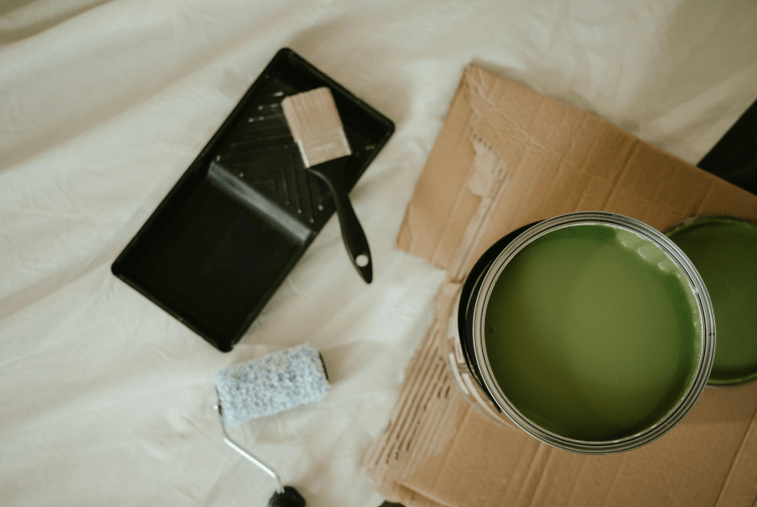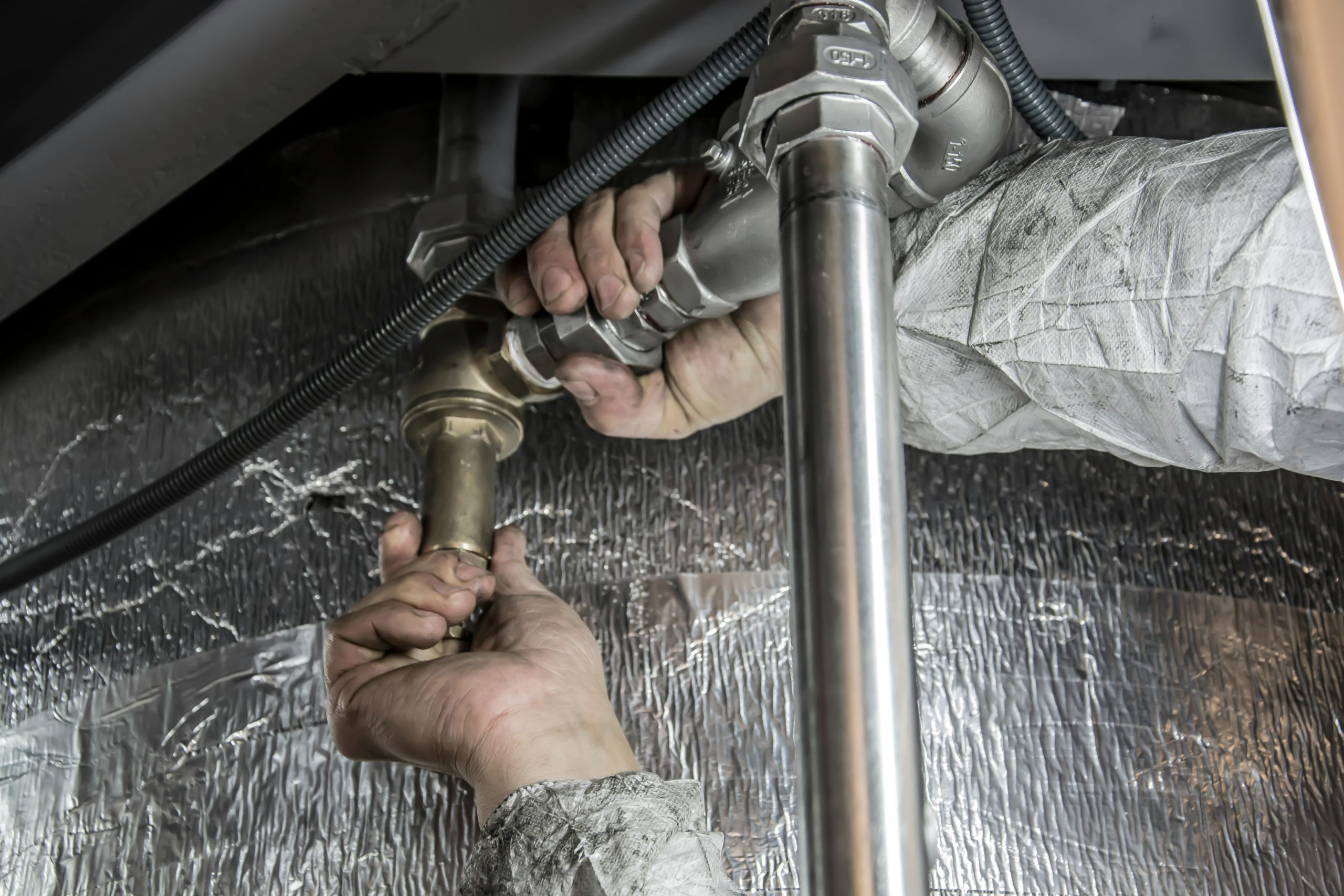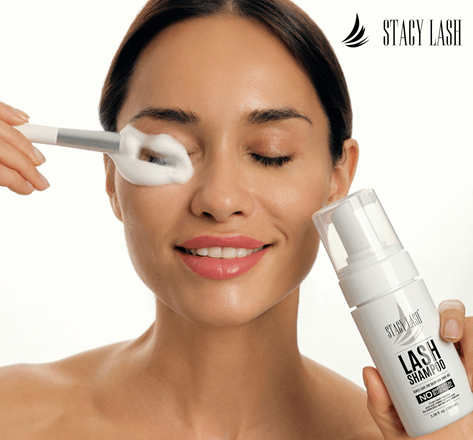Wood, Vinyl, or Iron? How to Choose the Right Fence for Your Property
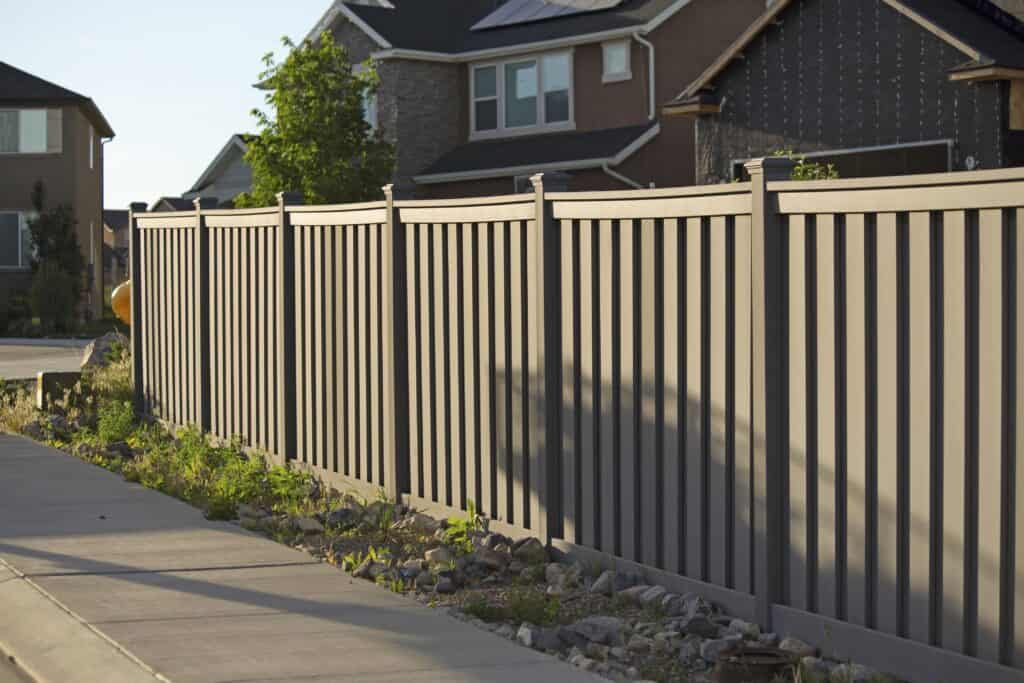
Choosing the right fence is more than picking a style. It's about finding a balance between style, function, durability, and budget. A good fence can make your property look better and work better.
Different materials have their own benefits. For example, a wooden fence brings a natural charm. Vinyl and iron fences are durable and easy to maintain. We must think about these points to make a smart choice.
By looking at the good and bad of each material, we can pick a fence that fits our needs. It will also make our property more valuable.
Key Takeaways
- Consider style, function, durability, and budget when choosing a fence.
- Different materials (wood, vinyl, iron) offer unique benefits.
- A well-selected fence can enhance your property's aesthetic and value.
- Assess your needs and preferences before making a decision.
- Balance between style and functionality is crucial.
Understanding Your Fencing Needs
To pick the right fence, you need to know what it's for. Do you want a vinyl fence for its lasting quality or a residential wood fence for its natural look? Your needs will help you choose.
Residential vs. Commercial Security Needs
Fences serve different purposes at homes and businesses. Home fences aim for privacy and looks. Business fences need to be strong and control access.
Height and Strength Considerations
The height and strength of your fence matter a lot. For safety, choose taller, stronger fences. For looks, pick shorter, lighter ones.
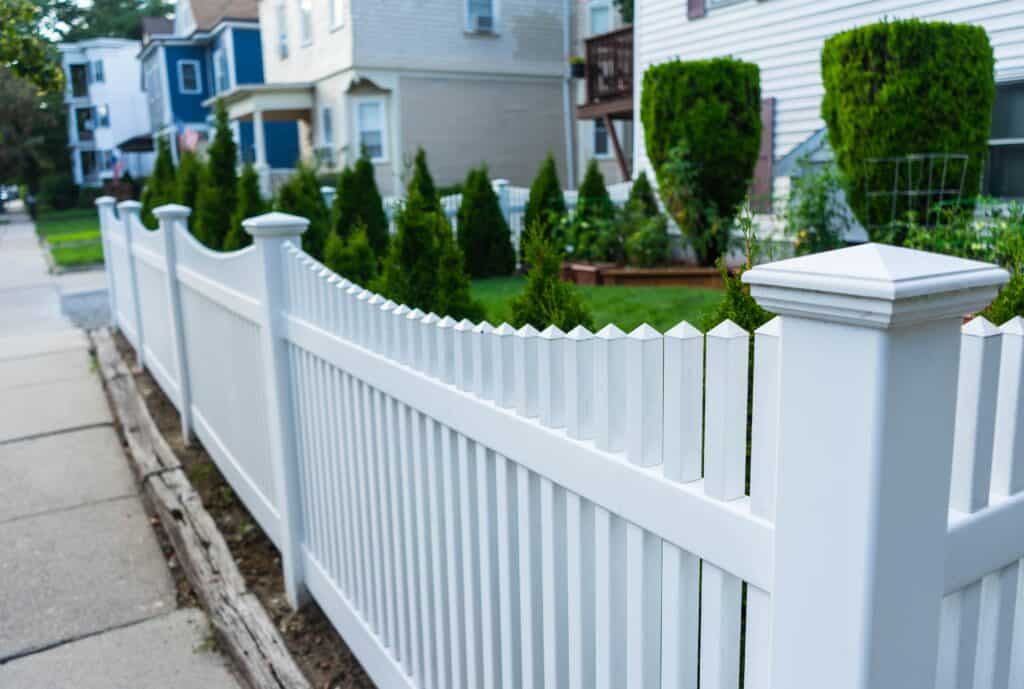
Think about how much privacy you want. A residential wood fence gives full privacy. But metal or vinyl fences let you see through.
Weather Resistance Requirements
Your fence must handle your area's weather. Near the coast, fences must fight off salt damage. Vinyl is a good choice here.
Terrain and Soil Conditions
The land and soil where you live affect your fence choice. Sloping land needs stepped fences. Rocky soil makes installation harder.
By thinking about these points, you can pick the best fence for you. Whether it's a vinyl fence for easy care or a wood fence for its classic look.
Wood Fence, Vinyl Fence, or Iron Fence: Comparing the Main Options
Choosing between wood, vinyl, and iron fencing depends on their unique benefits. Let's look at the differences to find the best fit for you.
Strength and Durability Comparisons
Wood fencing is strong but can rot and get damaged by insects if not treated. Vinyl fencing is durable and weather-resistant, needing little care. Iron fencing, especially ornamental iron, is very strong and lasts long, even in harsh weather.
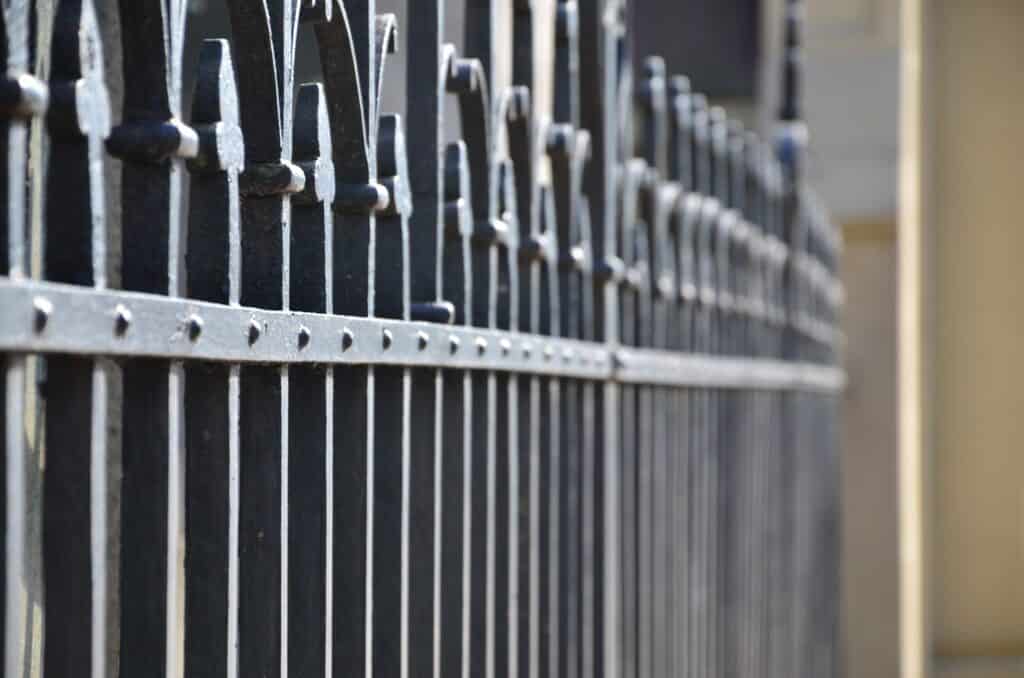
Wood fences have a classic look that goes well with many homes. Vinyl fences come in many colors and styles, looking like wood but needing no upkeep. Iron fences add elegance and boost property security.
Average Longevity by Material
Fence lifespan varies by material. Wood fences last 15 to 20 years, depending on the wood and care. Vinyl fences can last 20 to 30 years or more, being resistant to rot and insects. Iron fences, with proper care, can last 30 years or more.
Cost-Benefit Analysis Over Time
Wood fencing might cost less upfront but can be more expensive over time due to upkeep and damage. Vinyl fencing is pricier at first but saves money with its low maintenance. Iron fencing is expensive but offers long-term savings with its durability and low repair needs.
By examining these points, we can choose the right fence that meets our needs for durability, looks, and budget.
Wood Fencing: Natural Beauty and Versatility
Wood fencing offers a mix of function and beauty. It's a top pick for homes because it's affordable, eco-friendly, and comes in many styles.
Cedar, Pine, and Redwood Options
Choosing the right wood for your fence is key. Cedar, Pine, and Redwood are favorites. Cedar stands out for its lasting quality and fight against rot and bugs. Pine is cheaper but can be treated to last longer. Redwood adds a touch of luxury with its deep color and fine texture.
Deciding between treated and natural wood depends on what you value most. Pressure-treated wood fights off rot and bugs, perfect for wet areas. Natural wood, however, keeps things chemical-free and organic.
Residential Wood Fence Styles
Wood fences for homes come in many styles. You can find everything from classic picket fences to modern board-on-board designs. There's a style for every home.
Commercial Wood Fence Applications
Wood fencing isn't just for homes. It's great for businesses too. It can mark boundaries, improve the look of a property, and even welcome visitors.
Environmental Impact Considerations
Wood fencing is natural and renewable, but its environmental impact matters. Choose wood from sustainable forests and think about the fence's whole life to reduce harm.
Understanding wood fencing's pros and cons helps homeowners choose wisely. They can find a fence that's beautiful, useful, and kind to the planet.
Vinyl Fencing: Low Maintenance and Durability
Vinyl fencing is popular for its durability and easy upkeep. It's made from PVC plastic and has been around since the 1980s. It's a top choice for those wanting a fence that lasts.
Vinyl fencing stands up well to sunlight. Manufacturers use UV-resistant formulas to keep it looking good. This means the fence's color and shape stay the same for a long time.
Structural Reinforcements
Vinyl fencing is not just about looks; it's also strong. Structural reinforcements are added to panels and posts. This makes the fence strong against weather and more.
Residential Vinyl Fence Designs
Vinyl fencing comes in many designs for homes. You can find privacy fences or decorative picket fences. Vinyl fencing can be customized to match any home's style.
Commercial Vinyl Fence Applications
Vinyl fencing is also good for businesses. It's a durable and easy-to-care-for option. It helps secure properties and improve their look.
Long-term Performance Factors
The lasting power of vinyl fencing depends on several things. These include the material's quality, how it's installed, and the weather. High-quality vinyl fencing installed right can last a long time with little upkeep.
In summary, vinyl fencing is a great choice. It's durable, easy to care for, and looks good. It's a good alternative to wood and iron fences.
Iron Fencing: Elegance and Security
Iron fencing is perfect for those who want style and strong security. It's durable and adds elegance to any home.
Material Strength Comparisons
Iron fencing is very strong, stronger than wood or vinyl. It's great for those who care about security. Iron fences can handle bad weather and physical damage better than other fences.
Weight and Installation Differences
Iron fences are heavier than wood or vinyl fences. This means they need a strong installation, often by professionals. But, their weight also makes them more stable and secure.
Iron fencing comes in many styles, from classic to modern. Ornamental iron fences add a sophisticated look. They fit well with both old and new homes.
Custom Design Possibilities
Iron fencing is very flexible in design. You can pick from many patterns, heights, and finishes. This lets you create a unique look that matches your home. You can even get custom designs for a truly personal fence.
Security Features and Limitations
Iron fencing is strong and high, making it secure. But, it can rust if not cared for. Keeping it well-maintained is key to its lasting security.
In summary, iron fencing is a great mix of beauty and security. Knowing its strengths, installation needs, and design options helps homeowners decide if it's right for them.
Installation Considerations for Different Fence Materials
Los Angeles Fence Builders, Los Angeles
424-625-8561 hhttps://www.losangelesfencebuilders.com/
Knowing how to install your fence is key for a smooth process. A pro can make sure your fence is installed right and fast.
Skill Level Requirements
The skill needed for fence installation changes with the material. A wood fence needs more work because of the planks. It might need a higher skill level or more time.
Vinyl fencing is easier to install because of its interlocking design. An iron fence needs special tools and knowledge for welding and securing.
Necessary Tools and Equipment
The tools needed vary a lot. For a wood fence, you'll need post-hole diggers and concrete. You'll also need a saw for cutting lumber.
Vinyl fencing needs similar tools but might need special clips or fasteners. An iron fence requires heavy-duty equipment like welding gear and machinery for metal work.
Each material has its own challenges. Wood fences can rot or get insect damage if not treated. Vinyl fencing can crack in very cold weather. Iron fences can rust if not coated or maintained.
Proper Techniques for Longevity
To make your fence last, proper installation is crucial. This means setting posts in concrete, making sure the fence is level, and using the right fasteners or welding. This way, your fence will last longer and provide benefits for years.
Maintenance Requirements and Longevity
Keeping your fence in top shape is key. The material you pick affects how much upkeep it needs. This, in turn, impacts its cost and how long it lasts.
Staining and Sealing Frequency
A residential wood fence needs regular staining and sealing to fight off rot and weather damage. You should do this every 2-3 years, based on the wood type and where you live. On the other hand, commercial vinyl fence and iron fencing don't need these treatments, making them easier to care for.
Repair and Replacement Considerations
Fences can get damaged or wear out over time. Wood fences might need new boards, while iron fences might need rust treatment. Vinyl fences are tough but can crack or break if hit hard. Knowing what repairs your fence might need is important for planning ahead.
Cleaning your fence regularly helps keep it looking good and lasting longer. For wood fences, use a mild detergent and water. Vinyl fences can be washed with a hose and soap, and iron fences might need a wire brush to remove rust and dirt.
Addressing Damage and Discoloration
Weather and accidents can cause damage and discoloration. Fixing these problems quickly helps avoid more damage. For example, if a wood fence board is damaged, replace it right away to keep the fence strong.
Painting and Rust Treatment
Iron fencing needs to be painted regularly to stop rust. This keeps the fence looking good and lasting longer. Apply rust treatment as needed to stop corrosion.
Structural Integrity Checks
It's important to check your fence's structure often. Look for loose posts, damaged boards, or rust on iron fences. Keeping your fence strong and secure is key for safety and longevity.
Knowing how to care for your fence and how long it will last helps you make a smart choice. Whether you pick a residential wood fence, a commercial vinyl fence, or iron fencing, regular care is essential to make it last.
Conclusion
Choosing the right fence for your property is very important. It affects how your property looks and works. The type of fence you pick - like a wooden, vinyl, or iron fence - depends on what you need and like.
Each type of fence has its own good points. A wooden fence looks natural and can be changed to fit your style. A vinyl fence is easy to keep up and lasts a long time. An iron fence adds beauty and keeps your property safe.
When you decide, think about how it's installed, the cost, and how much upkeep it needs. By looking at these things, you can find a fence that makes your property look better and works well for you.
The right fence can really change how valuable your property is and how happy you are at home. We hope this guide made it easier for you to pick the perfect fence for your

